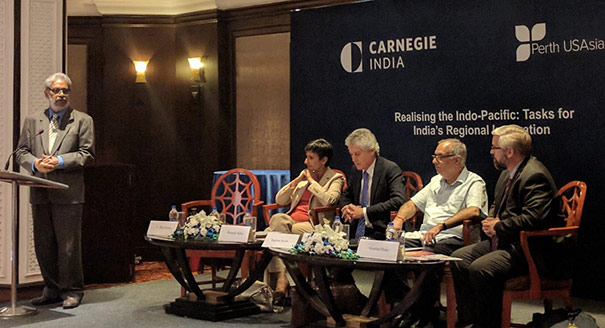Registration
You will receive an email confirming your registration.
In a recent report published by the Perth USAsia Center, scholars from India and Australia examined India’s integration into the emerging security architecture encompassing the Indian Ocean and the Eastern Pacific Ocean. The Indo-Pacific region is fast becoming a prominent geostrategic theater in a shifting global order. This report discusses India’s engagements, highlighting issues and challenges for New Delhi as it sets out to play an active role in the Indo-Pacific.
Carnegie India, in partnership with Perth USAsia Center, hosted the launch of this report, which featured a keynote address by former Australian minister for foreign affairs and minister for defense, Stephen Smith. This was followed by a panel discussion with Professor Gordon Flake, founding CEO of the Perth USAsia Center, Harinder Sidhu, current Australian high commissioner to India and Bhutan, Biren Nanda, former Indian ambassador to Indonesia, Timor-Leste, and ASEAN, and Stephen Smith. The discussion was chaired by C. Raja Mohan, director of Carnegie India.
Discussion Highlights
- The Indo-Pacific Conceptual Framework: Participants discussed the role of the Indo-Pacific region—especially given the emergence of new key players such as India and Indonesia—in the international order. They argued that although the Indo-Pacific as a construct only codifies a structure that already exists, its full realization necessitates recognizing the global influences of India and Indonesia. However, participants cautioned against limiting the focus of the terminology to its geographical connotations. They stated that the “Indo-Pacific” should be understood as a structural concept that traces the evolution of the region.
- Emerging Security Architecture in the Indo-Pacific: Participants said that U.S. President Donald Trump’s approach to the Indo-Pacific region is generating significant uncertainty in Asia. They argued that countries such as India, Indonesia, Australia, and Japan might view this uncertainty as an opportunity to reshape the regional order. Participants also discussed China’s exponential rise in global politics and expanding regional influence. They argued that in order to become strong balancing actors, India and Australia should begin to rethink their strategic positions. Some participants discussed the emergence of trilateral engagements and the importance of minilateral collaborations between like-minded countries to help tackle regional security issues such as terrorism, climate change, and growing militarization.
- Contemporary Indo-Australian Relations: Participants welcomed the introduction of joint naval exercises between India and Australia, such as the AUSINDEX,. As members of several programs and multilateral organizations in the Indian Ocean Region, both New Delhi and Canberra must expand political conversation and security cooperation, they said. They also stated that Indo-Australian engagements should broaden to include higher education, technology, agriculture, and health. Diversifying engagement levels in these areas, they said, would not only deepen Indo-Australian relations, but also act as a stabilizing influence on the region. Participants also discussed the prospect of increasing economic engagement between the two countries, since both have strong economies.
- India’s Role in the Indo-Pacific: Participants emphasized that India plays a central role in the security architecture of the Indo-Pacific. They stated that although India continues to enhance its bilateral and regional ties—particularly with the ASEAN nations and Japan—India’s relationship with China and the United States is crucial in determining the future of the region. Participants highlighted India’s past actions, where it played a mediating as well as balancing role between China and the United States. They argued that the relative U.S. decline, along with increased Chinese assertiveness, requires India to actively work toward restoring the geoeconomic balance in the region. Participants said that after the Second World War, U.S. leadership determined the global and Asian security architecture. Now other powers, particularly China and India play distinct roles in the current global security architecture. They argued that India must reinforce its centrality and drive policy actions in the region, as the power dynamics in the Indo-Pacific continues to unfold. Participants recommended that given the rising levels of economic integration in the region, India must intensify trade relations with other regional actors so that they can diversify their trade and reduce dependence on China.
This event report was prepared by Rhea Menon and Deepakshi Rawat, interns at Carnegie India.
Agenda
2:30 p.m.
Tea and Registration
3:00 p.m.
Welcoming Remarks
C. Raja Mohan
3:10 p.m.
Keynote Address
Stephen Smith
3:30 p.m.
Panel Discussion
- Gordon Flake
- Biren Nanda
- Harinder Sidhu
- C. Raja Mohan
4:15 p.m.
Q&A
5:00 p.m.
High Tea
Speakers
Stephen Smith
Stephen Smith is the former Australian minister for defense and minister for foreign affairs
Gordon Flake
Gordon Flake is the founding CEO of the Perth USAsia Center
Biren Nanda
Biren Nanda is a former Indian high commissioner to Australia, as well as former Indian ambassador to Indonesia, Timor-Leste, and ASEAN
Harinder Sidhu
Harinder Sidhu is the current Australian high commissioner to India and ambassador to Bhutan
C. Raja Mohan
C. Raja Mohan is the director of Carnegie India
